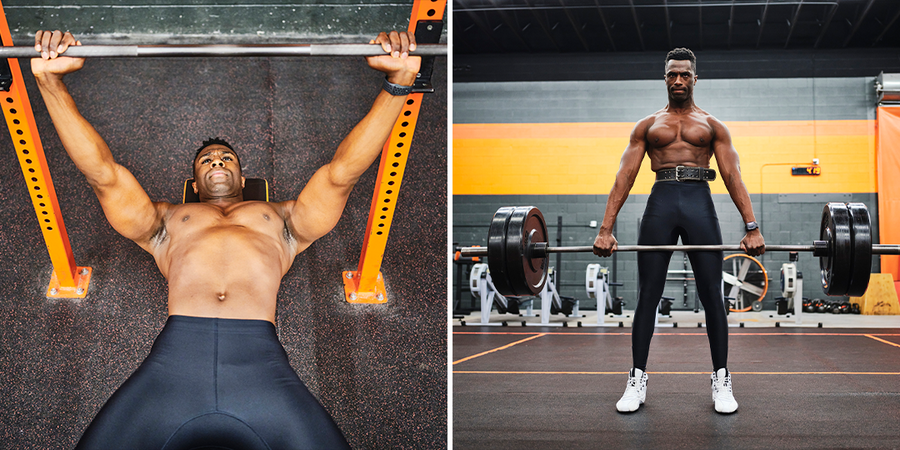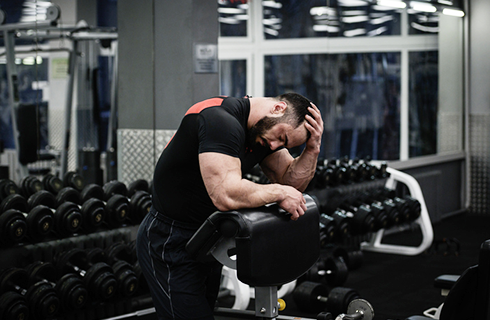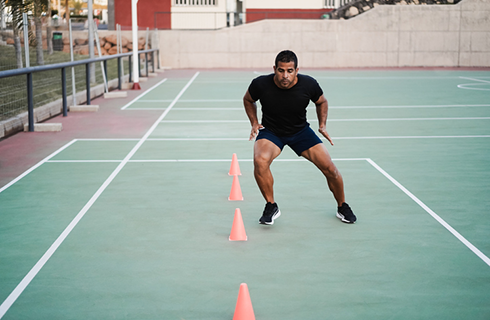
Are Your Two-a-Day Workouts Helping or Hurting Your Goals?
By Linnea Zielinski
If you're driven about an aspect of your fitness, you may wonder whether two-a-day workouts will help you accomplish your goal twice as quickly.
Two-a-days are exactly what they sound like: You log a workout twice a day. You may have fond (or not-so-fond) memories of these from high school sports teams. They're all over social media these days and included in popular lifestyle programs like 75 Hard. But do you need them? Are two-a-days double the payoff or twice as risky?
Shorten recovery time between workouts by repairing muscle and reducing soreness with LADDER Whey and Plant Protein.
.
Are There Benefits to Two-a-Days?

We'll cut right to the chase: When it comes to the advantages of doing two workouts a day versus one, “there really aren't any unless you're an elite athlete," says Trevor Thieme, CSCS, LADDER's senior director of fitness and nutrition content. “If you have enough gas in the tank to tackle two daily workouts, you likely aren't going hard enough in either one to optimize your progress toward your goals."
To be clear, that doesn't mean that you should never work out more than once a day. “If you're too busy to complete your whole workout all at once on some days, go ahead and split it up," Thieme says.
But "divide and conquer" isn't your only option when you're pressed for time. "You should also consider doing a higher-intensity, shorter workout rather than a longer one split into two parts," Thieme suggests. “When you get right down to it, workout density trumps workout duration."
.
What Are the Cons of Two-a-Days?

Unless you're splitting one workout into two parts to accommodate your schedule, working out twice a day is more likely to impede your progress than hasten it.
1. Increases your risk of overtraining
In order to adapt to the training stimuli provided by your workouts, your body needs sufficient time to recover between them. “Pushing yourself too hard too often can put you on the fast track to overtraining," warns Thieme. "That can not only land you in a training rut, but can also increase your risk of injury."
2. Decreases physical performance
That training rut caused by overtraining will include a decrease in your performance during workouts. What's worse, the effects of overtraining can spill into your everyday life, and include mood swings, insomnia, and loss of appetite.
3. Negatively affects muscle growth
Building muscle mass is a process of creating micro-damage in your muscles, which triggers repair and adaptation processes that leave you stronger and fitter than before. But overtraining affects muscle repair, recovery, and growth. If you're not building muscle effectively, you'll have a more challenging time reaching your goals.
.
Should Beginners Work Out Twice a Day?
In general, no. “There's almost no reason to do two-a-days," says Thieme. “Besides, most people have trouble finding time to do one workout a day, let alone two."
When you're just starting out, focus on being consistent, not overzealous.
Thieme explains that beginners are at the same risk of overtraining as everyone else. That's because overtraining “occurs when you push yourself too hard, too often for your fitness level, whatever that fitness level is."
But if you're a beginner, you may not realize how much overdoing it on workouts can detract from your goals. “No matter what your fitness level is, overtraining will put the brakes on your gains and increase your risk of injury," he underscores.
.
3 Training Ideas to Reach Your Goals Faster

“When it comes to fitness, more isn't necessarily better," says Thieme. Instead of hitting a workout twice a day, consider these ways you can train smarter, not harder, to achieve your goals faster.
1. Focus on workout quality, not duration
How long you work out is far less important than how you work out. “As long as your workouts are aligned with your fitness objectives, and you challenge yourself multiple times a week, you will reach your goals," he says.
2. Prioritize rest
Rest days are just as important as your workouts, and you should prioritize them. Even if you're already taking rest days, you should watch for signs of overtraining like increased fatigue, sleeplessness, reduced athletic performance, mood changes, and a decline in motivation. If you notice any of these, it's time to dial back your training volume and intensity until your performance is back on track.
3. Increase your daily activity level
A daily workout doesn't counterbalance an otherwise sedentary lifestyle. That's why it's essential to become more active in general.
"Focus on increasing your non-exercise activity thermogenesis (NEAT), which is all of the calories you burn throughout the day outside of exercise," says Thieme. “If your goal is weight loss, or even if it's just being healthier overall, you need to give NEAT just as much attention as working out."



